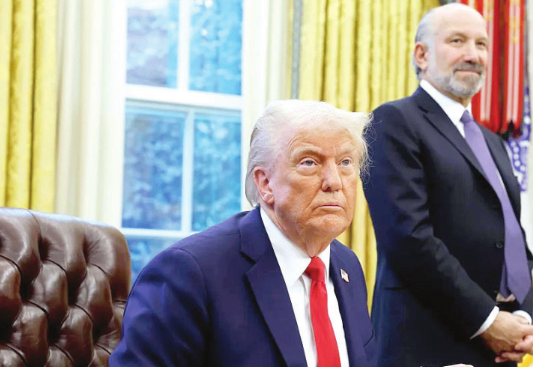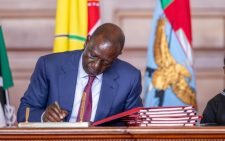Trump Orders: Shifting US role globally

Barely a months since returning to the White House for his second term, President Donald Trump has been shaking both domestic and international expectations with a series of executive orders. These moves appear to have far-reaching implications, unsettling Americans, U.S. allies, and global competitors alike.
His decisions from undoing his predecessor’s climate change progress to reigniting trade wars are raising concerns about America’s role on the global stage.
Trump’s actions challenge the traditional image of America as a leader dedicated to global well-being. One of the most significant moves is his withdrawal from the World Health Organization (WHO). Historically, the U.S. has contributed 22 percent of the WHO’s budget, and its pullout could have severe consequences for global health, particularly when the world is still grappling with the aftereffects of the Covid-19 pandemic and facing other health threats like Mpox, Ebola, and Marburg. This decision signals a shift in America’s international priorities, moving away from global cooperation on pressing health issues.
For Africa, already vulnerable with fragile health systems, America’s exit from the WHO is especially concerning. As the U.S. pulls back, China is stepping in to fill the gap. China has expressed its commitment to supporting the WHO, recognizing its central role in global health governance. By strengthening international public health cooperation, China aims to boost its influence in Africa and other developing regions. This shift in support highlights China’s growing presence and its potential to shape global health strategies.
On the economic front, Trump’s trade policies are escalating tensions worldwide. On February 1, 2024, he signed an executive order imposing a 10% tariff on Chinese imports and 25% on goods from Canada and Mexico. Although the tariffs on Canada and Mexico were temporarily paused, the move sparked global opposition, especially in light of the fragile global economy post-pandemic. In retaliation, China imposed tariffs on U.S. exports, including coal, natural gas, and agricultural machinery, escalating the situation into a trade war that is destabilizing global trade.
History has shown that trade wars rarely result in winners. Protectionist policies disrupt global supply chains and create economic instability. Instead of focusing on maximizing one country’s gains at the expense of others, nations should prioritize cooperative trade agreements. The global economy is more interconnected than ever, and isolationist policies only undermine the very economies they aim to protect. The ongoing U.S.-China tariff conflict is a stark reminder of the importance of collaboration in the global economic landscape.
Additionally, Trump’s decision to halt USAID operations has had significant consequences for developing nations, particularly in Africa. Critics argue that USAID has misused American taxpayer money, but its work in global development has been invaluable. The agency has supported health, education, and infrastructure projects in countries where other nations have failed to act. Its suspension will not only hurt the developing world but also US pharmaceutical companies that rely on USAID contracts. The move highlights the broader issue of America’s diminishing commitment to foreign aid and international cooperation.
The US’s withdrawal from international organizations like the WHO and the halting of USAID’s operations are signals of a broader shift toward isolationism. While foreign aid remains an important tool for global development, Africa and other regions need to transition toward self-sufficiency. Leveraging natural resources, fostering strategic partnerships, and learning from China’s model of mutual benefit could help these nations become more independent and reduce their reliance on Western assistance.
On the geopolitical front, Trump’s rhetoric around the Panama Canal and Greenland highlights his desire to reassert U.S. dominance over critical global trade routes. His comments about taking back control of the Panama Canal have raised concerns in Latin America, where tensions over U.S. influence could worsen. Similarly, Trump’s interest in Greenland reflects broader geopolitical concerns, particularly with China and Russia increasing their presence in the Arctic. Control over these strategic waterways and territories remains central to U.S. foreign policy, especially as global shipping increasingly bypasses traditional chokepoints like the Suez and Panama Canals.
The Northern Sea Route (NSR) along Russia’s Arctic coastline has emerged as a new frontier for global trade. As climate change melts the ice caps, the NSR is becoming a viable shipping route, bypassing traditional trade routes. This shift challenges Western maritime powers, including the U.S., as they contend with new geopolitical realities. Greenland, strategically located along these emerging routes, is gaining significance in global maritime affairs. Its role in managing Arctic shipping routes could become critical as international trade continues to evolve.
Trump’s rhetoric on these issues reflects a broader concern over China’s growing influence in international trade, particularly in regions like Latin America and the Arctic. His focus on these areas could destabilize relations with countries in these regions and exacerbate tensions with China and Russia. As global power dynamics shift, control over strategic maritime routes will remain a focal point in U.S. foreign policy.
Furthermore, Trump’s environmental policies have raised alarms about the U.S.’s commitment to global climate action. Trump’s rollback of climate regulations and withdrawal from international climate agreements could have devastating consequences for global efforts to combat climate change. His reluctance to engage in global climate initiatives may embolden other nations to delay or scale back their own actions, ultimately leaving the world’s most vulnerable regions such as Africa to bear the brunt of the climate crisis.
Geopolitical rivalry, particularly between the U.S. and China, should not overshadow the need for international cooperation on climate change. The U.S. and China, as the world’s largest emitters, must lead by example and prioritize collaborative efforts to mitigate the impacts of global warming. If both countries continue to prioritize their geopolitical rivalry over environmental cooperation, the consequences for vulnerable nations will be dire.
Trump’s environmental rollback policies, motivated by geopolitical concerns over China’s green energy ambitions, could undermine global climate action. Climate change is a global issue that requires coordinated efforts. If the U.S. continues to retreat from international agreements, it risks setting a dangerous precedent that could prompt other nations to follow suit. As a result, the world’s most vulnerable populations particularly in Africa will continue to bear the greatest burden of climate change, despite contributing the least to its causes.
In conclusion, President Trump’s executive orders reflect a significant shift in America’s foreign policy and global role. His decisions to withdraw from international organizations, impose tariffs, and prioritize isolationist policies signal a departure from the collaborative global leadership that the U.S. once championed. While America may view these actions as protecting its national interests, the broader implications for global health, trade, and the environment are concerning.
As the world faces complex challenges ranging from the aftermath of the COVID-19 pandemic to rising geopolitical tensions and the climate crisis the need for international cooperation has never been greater. The U.S. must reconsider its approach and embrace multilateralism, dialogue, and openness to create a more stable, equitable, and sustainable future for all nations. Only through collaboration can the world address the pressing issues of our time and build a more resilient global economy.
By refocusing on multilateralism and cooperation, the U.S. can once again take a leading role in global development, environmental protection, and economic growth. A stable, prosperous world requires cooperation over competition, and nations must prioritize the collective good over isolated self-interest. The path forward requires diplomacy, shared responsibility, and a commitment to tackling the world’s most pressing challenges.
The writer is a Journalist and Communications consultant












